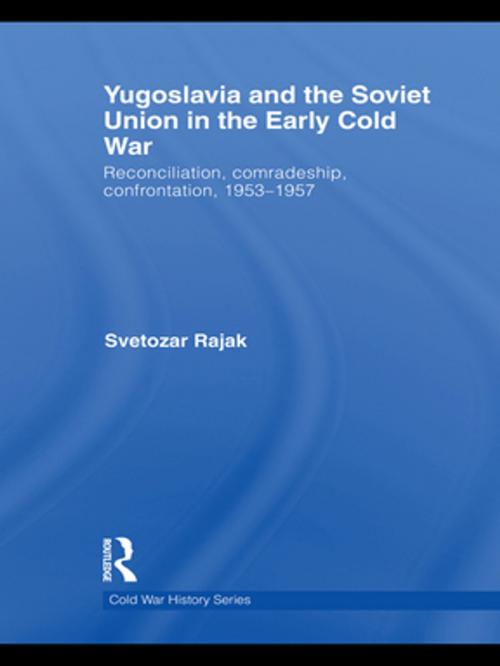Yugoslavia and the Soviet Union in the Early Cold War
Reconciliation, comradeship, confrontation, 1953-1957
Nonfiction, History, Eastern Europe, European General, Military| Author: | Svetozar Rajak | ISBN: | 9781136905513 |
| Publisher: | Taylor and Francis | Publication: | October 18, 2010 |
| Imprint: | Routledge | Language: | English |
| Author: | Svetozar Rajak |
| ISBN: | 9781136905513 |
| Publisher: | Taylor and Francis |
| Publication: | October 18, 2010 |
| Imprint: | Routledge |
| Language: | English |
This book provides a comprehensive insight into one of the key episodes of the Cold War – the process of reconciliation between Yugoslavia and the Soviet Union.
At the time, this process had shocked the World as much as the violent break-up of their relations did in 1948. This book provides an explanation for the collapse of the process of normalization of Yugoslav-Soviet that occurred at the end of 1956 and the renewal of their ideological confrontation. It also explain the motives that guided the two main protagonists, Josip Broz Tito of Yugoslavia and the Soviet leader Nikita Sergeevich Khrushchev.
Based on Yugoslav and Soviet archival documents, this book establishes several innovative theories about this period. Firstly, that the significance of the Yugoslav-Soviet reconciliation went beyond their bilateral relationship. It had ramifications for relations in the Eastern Bloc, the global Communist movement, and on the dynamics of the Cold War world at its crucial juncture. Secondly, that the Yugoslav-Soviet reconciliation brought forward the process of de-Stalinization in the USSR and in the Peoples’ Democracies. Thirdly, it enabled Khrushchev to win the post-Stalin leadership contest. Lastly, the book argues that the process of Yugoslav-Soviet reconciliation permitted Tito to embark, together with Nehru of India and Nasser of Egypt upon creating the new entity in the bi-polar Cold War world – the Non-aligned movement.
This book will be of interest to students of Cold War History, diplomatic history, European history and International Relations in general.
Svetozar Rajak is a lecturer at the London School of Economics and Political Science. He is the Managing Director of the LSE Cold War Studies Centre and is a member of the Editorial Board of the journal Cold War History.
This book provides a comprehensive insight into one of the key episodes of the Cold War – the process of reconciliation between Yugoslavia and the Soviet Union.
At the time, this process had shocked the World as much as the violent break-up of their relations did in 1948. This book provides an explanation for the collapse of the process of normalization of Yugoslav-Soviet that occurred at the end of 1956 and the renewal of their ideological confrontation. It also explain the motives that guided the two main protagonists, Josip Broz Tito of Yugoslavia and the Soviet leader Nikita Sergeevich Khrushchev.
Based on Yugoslav and Soviet archival documents, this book establishes several innovative theories about this period. Firstly, that the significance of the Yugoslav-Soviet reconciliation went beyond their bilateral relationship. It had ramifications for relations in the Eastern Bloc, the global Communist movement, and on the dynamics of the Cold War world at its crucial juncture. Secondly, that the Yugoslav-Soviet reconciliation brought forward the process of de-Stalinization in the USSR and in the Peoples’ Democracies. Thirdly, it enabled Khrushchev to win the post-Stalin leadership contest. Lastly, the book argues that the process of Yugoslav-Soviet reconciliation permitted Tito to embark, together with Nehru of India and Nasser of Egypt upon creating the new entity in the bi-polar Cold War world – the Non-aligned movement.
This book will be of interest to students of Cold War History, diplomatic history, European history and International Relations in general.
Svetozar Rajak is a lecturer at the London School of Economics and Political Science. He is the Managing Director of the LSE Cold War Studies Centre and is a member of the Editorial Board of the journal Cold War History.















